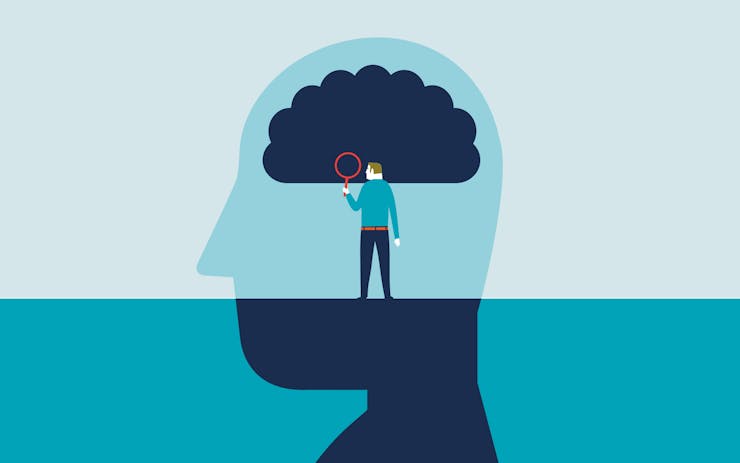A study published today in the journal Nature Neuroscience makes a bold claim about the relationship between cannabis use and schizophrenia. Researchers found that the evidence supporting the theory that cannabis use can cause schizophrenia was “weak”—but found strong support for the idea that schizophrenia can cause or increase cannabis use.
People struggling with schizophrenia may try to alleviate their symptoms by self-medicating with cannabis.
“Our findings may indicate that individuals at risk for developing schizophrenia” experience symptoms “that make them more likely to start using cannabis to cope or self-medicate,” wrote the study’s authors.
The peer-reviewed report, which included contributions from more than 80 researchers around the world, was based on the largest genetic study of cannabis use ever undertaken.
Scientists have long suspected a connection between cannabis use and schizophrenia. But the research remains unclear about a possible causal relationship between the two.
Previous Reports: Cannabis & Schizophrenia
The Nature Neuroscience study was based on gene testing of more than 184,000 people, including 22,000 clients of 23andMe, the personal health and ancestry company. The study was coordinated by the International Cannabis Consortium, a project to identify genetic risk variants for cannabis use.
“Previous studies have shown that genetic risk factors for cannabis use and schizophrenia are positively correlated,” the authors noted.
In general, those studies have indicated that cannabis use by young people doesn’t itself cause schizophrenia—the evidence has pointed more to a dynamic where cannabis use can speed up the emergence of the mental disorder among those who have a genetic predisposition to the disease. That’s an especially critical concern because studies have shown that the earlier schizophrenia manifests in a person’s life, the more difficult it is to control and effectively manage.
Breaking New Ground
In the current genome-wide association study, researchers confirmed a “significant genetic correlation” between cannabis use and schizophrenia. But instead of cannabis causing the early emergence of schizophrenia, the scientists found causation moving in the opposite direction: The emergence of schizophrenia, they wrote, led to a greater probability of cannabis use.
Why? One theory is that people struggling with early signs of schizophrenia may try to calm their brain and alleviate other symptoms by consuming cannabis.
“Our findings may indicate that individuals at risk for developing schizophrenia may experience prodromal symptoms”—in other words, early signs of the condition—“or negative affect that make them more likely to start using cannabis to cope or self-medicate,” the report says.
Explore the World’s Largest Cannabis Strain Database
Higher Risk, Education, Income
The study also found surprising correlations between cannabis consumption and other lifetime attributes. Researchers found positive genetic correlations between cannabis use and:
- Risk-taking behavior
- Openness to experience
- Educational attainment
- Higher household income
The authors of the study suggest a number of theories for those positive correlations. Cannabis use is associated with higher childhood family socioeconomic status in the United States, for instance—so those who tend to consume cannabis also tend to have more family resources to support them on a path leading to higher education and income. The authors also suggest that people raised in families of higher socioeconomic status may have increased access to cannabis.
Shop highly rated dispensaries near you
Showing you dispensaries nearOne of the most intriguing parts of the study, though, indicated a positive correlation between cannabis use, risk-taking behavior, and “openness to experience.” Openness to risk and new experiences are also—although the authors don’t acknowledge it—traits that can lead to success in education and income.
Caveat Emptor
The Nature Neuroscience study isn’t perfect, and it won’t be the final word on the subject. Although the study was the largest of its kind to date, it also had some significant flaws. People in the study were separated into two overly simplified categories: cannabis users and non-users. Very light consumers and people who may have tried a few puffs in college were lumped together with heavy daily consumers in the “cannabis users” group.
Also, there was no differentiation in types of cannabis use. In the United States, medical marijuana is legal in 30 states and used by millions of patients to alleviate serious ailments. Cannabis is also enjoyed as a social intoxicant by millions of non-patients. None of those differences was taken into account.
The study’s authors also play loose with terms like “cannabis use disorder” and “cannabis-dependent individuals,” as if every person who ever used cannabis is dependent or the victim of a disorder. The study also notes that cannabis use “is associated with various adverse mental health outcomes, including psychosis and schizophrenia,” but the authors make no mention of cannabis use and positive health outcomes, including the treatment of chronic pain, PTSD, epilepsy, and many other conditions recognized by many states around the country.





